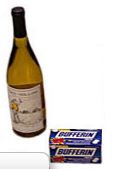There's no caffeine in Muscadet
The way I start out my day seldom changes, yet for some reason this morning it suddenly seemed blogworthy.
I make coffee. Here it comes...



An unassuming enough of a start to one's day, you'd think. But actually, really really blogworthy...
Organic vs conventional! Fair trade vs direct trade! Caffeinated vs decaf! Espresso in a shot vs espresso in a cup!? Just pick your talking point.
To make my espresso-based latte-macchiato hybrid that I drink, I use these beans. They are made by Intelligentsia Coffee and Tea, a coffee importer.
I have other coffee in my cupboard ... this one... this one... and I even forgot I had this one.

I usually bypass them unless I've run out of freshly roasted Intelligentsia. But today I realize that all these coffee labels remind me a lot of wine labels. They're less a manufacturer's smacked-on trademark and more a tribute to the grapes and beans that go into it.
And while overly processed bread, dairy and fruit preserves drive me nuts, I don't seem to mind consuming processed foodstuffs when it comes to wine and coffee. Maybe that's because each one undergoes a substantial transformation -- they require significant craftmanship and some exact science before they can become acceptably drinkable. So it's the non-transformative processed food I avoid: industrial fish sticks and other frozen dinners and prepared foods that are overpackaged conveniences -- which really only seem to replicate the easier kitchen tasks I can perform without much effort, and usually, with better results.
I suppose I could try roasting my own coffee. A couple of years ago I made the leap to grinding my own coffee beans (even though it's only a blade, not a mill, grinder) and that paid off nicely for me, including this morning, as you can see.


I'm nowhere near taking on winemaking.
ORGANIC VERSUS CONVENTIONAL AGRICULTURE
I feel the first talking point coming on.... Another reason I don't mind consuming processed items like wine and coffee is because they are both involved in a positive labeling endeavour. During WLW 1 (Wine Label Week), I saw that labels don't need to be obscure sources of information once you know what you are looking at. And new label designations based on environmental certifications for organic or biodynamic farming -- Terra Vitis, Eco-Cert, Demeter, etc -- are generally being conveyed clearly to the consumer. These are good developments.
Coffee is similar to wine on being green and accountable to drinkers in how it obtains standards from a group called Fairtrade Labeling Organizations International, which sets rules on farming techniques, pesticides and recycling practices. The organization even has a program to encourage children of farmers to stay enrolled in school, so the initiative is obviously based on more than how food is cultivated but on equity practices too, which are primarily concerned with the condition of the farmer and his laborers.
Like wine, coffee is certified through visits to farmers to verify that they are meeting the criteria that bar, among other things, the use of child labor and harmful chemicals.
FAIR VERSUS DIRECT TRADING
So, like wine, some coffees can carry the organic label. On the whole, also like wine, most are still not certified. At the risk of sounding like a cop-out, sometimes you can rely on and trust in the brand name you endorse. Intelligentsia is that trusted brand name that appears on the label. Even when no official green certification is there, I buy Intelligentsia. Because while they are actually not a "fairtrade" certified company, they are a reputable "direct" trader.
That's because Intelligentsia has spoken out. They have said that fair trade coffee is as exploitive as the conventional kind, especially in countries that produce the highest-quality beans -- like Colombia, Ethiopia and Guatemala.
"Fair trade farmers there are barely paid more than their counterparts in Brazil, though their crops become gourmet brands, selling for a hefty markup, said Geoff Watts, vice president for coffee at Intelligentsia."
Full details in this business article in the New York Times.
CAFFEINATED VERSUS DECAFFEINATED COFFEES
Speaking of the New York Times, a Yahoo! feature on caffeine pointed to a NYT blog post which in turn pointed to my blog via one of the comments I left. As a result, my hits went absolutely through the roof -- more than a hundred visitors were on my site at once and 800 visits for the day total. I could post these record-setting charts and stats but I myself was going through the roof at the time too, so I'd rather talk about that.
Basically, coffee is a broad term and the coffee I drink and the coffee Tara Parker-Pope writes about in her NYT blog called Well about are not the same thing. She reported on drip coffee caffeine levels and then ran a photo of an espresso-based coffee. These are not the same types of coffee, especially when it comes to caffeine level.
In her Well blog, Parker-Pope acknowledged my issue with this in saying that "You are correct that per serving, espresso (which is served in shots rather than cups) typically does have less caffeine than drip coffee."
ESPRESSO IN A SHOT VERSUS ESPRESSO IN A CUP!?
But espresso is espresso is espresso. It doesn't matter if an espresso shot is served in a cup with milk as a cappuccino, or if it's served solo in a shot. It's still a single espresso, and it'll have the same level of caffeine no matter where it is.
There is a reason I am making a point about how different espresso is. The image attached to this caffeine story as it made the rounds through the media is clearly a an espresso-based beverage -- a cappuccino or similar artisanal coffee from the looks of its latte art on the top. Cappuccinos and other artisanal coffees like macchiatos and lattes, are the combination of a shot of espresso and varying amounts of warmed milk. Cappuccinos therefore have the same low level of caffeine as the espresso shot it is made with. But most importantly, cappuccinos by their very definition are not drip coffees, which are brewed and which are more heavily caffeinated. Yet a drip coffee is not the image chosen for this damning report on some drip coffees -- specifically the problematic levels of caffeine in drip decaf.
Why place an illustration of a non-drip coffee beverage under the headline? And why a beverage that uses a single shot of espresso which has LESS caffeine (as low as 30 mg) than a cup of Dunkin' Donuts drip decaf (as high as 32 mg)? Clearly, it's because image sells and a pretty one will draw more interest than brown, watery and lifeless decaf. Those readers who don't care about caffeine will visit just to see the dazzling latte art. Those readers who do care about caffeine levels will visit to analyze their coffee intake. In both cases, readers leave with an false association of artisanal coffee and high caffeine.
I think this is shoddy journalism by the New York Times and they should be more upfront about the photos they choose to run.
Cappuccino, which when made by a real barista, looks better, tastes better and actually is better for you on the caffeine front than the unattractive brews festering in decaf coffee pots. But based on the warning-alert nature of the headline and its accompanying image, it's the attractive espresso-based coffee that undeservingly receives the black mark, not the black decaf, the ugly fast-food swill that is actually the problem.
And once again, the media circus health report sets out on the wrong foot and potentially does more harm than good.
















